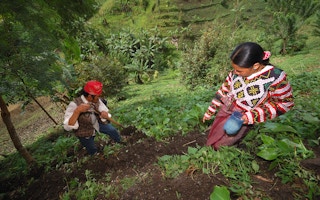The area of land legally owned by and designated for Indigenous, Afro-descendant, and local communities has increased in dozens of countries in recent years - a trend that could help tackle deforestation and climate change, new research has found.
These groups gained legal recognition to more than 100 million hectares (about 247 million acres) of land across at least 39 nations between 2015 and 2020, according to a new report by the Rights and Resources Initiative (RRI), a global coalition.
Studies increasingly point to granting land rights to Indigenous and local communities as one of the best and most cost-effective ways of preventing deforestation, which in turn reduces global warming and losses of biodiversity.
People from Indigenous, Afro-descendant and local communities account for up to 2.5 billion of Earth’s population and customarily hold and use at least 50 per cent of its land, RRI said.
A global biodiversity pact adopted in December – to protect at least 30 per cent of the planet’s land and oceans by 2030, also known as 30x30 – included an explicit recognition of Indigenous land rights, which advocates said was key, as a large proportion of the world’s remaining biodiversity is within traditional lands.
RRI coordinator Solange Bandiaky-Badji said the legal gains documented in the study were “not an accident … (but) a result of years of sustained struggle and advocacy by rights-holder and civil society groups with very little direct support”.
“Much more could be achieved if governments, donors and development institutions prioritised collective tenure rights and rights-based approaches in their climate and biodiversity commitments,” she said in a statement to accompany the report.
Here are some details from RRI’s research:
How can recognizing communal land protect nature?
Formally recognizing Indigenous and local communities’ rights to the territory where they live is an effective tool to stop deforestation which often results in public land being claimed by private interests - often for farming, activists say.
In addition to preventing forest loss and degradation, Indigenous and Afro-descendant peoples tend to produce food using more sustainable methods than in mainstream agriculture.
They also monitor their territory and protect it from trespassers such as illegal miners and loggers, often reporting environmental crimes to the authorities and other actors.
In Ecuador, for example, court rulings in recent years have given the Cofan indigenous group the right to order intruders off their land and to confiscate their equipment.
Meanwhile, in Brazil, the government is obliged to remove any invaders from fully-recognised Indigenous land.
“In Panama, there is a constant invasion of territories that threatens nature and our traditional knowledge,” said Sara Omi, an Indigenous leader of the Embere people in Panama.
“There are already norms (to protect the Indigenous territory), but they have to be implemented,” she told a briefing on RRI’s report.










